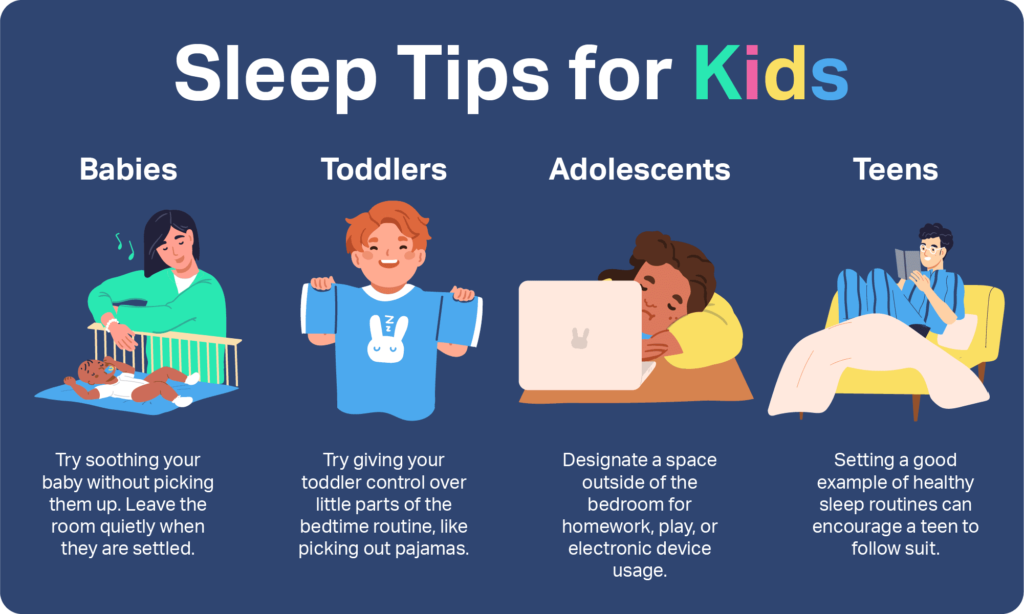Helping Your Child Sleep Better – A Guide for Healthy Sleeping Habits (2025)
Is your child staying up too late or glued to screens at night? Learn easy and realistic ways to build healthy sleep routines for your kids, tailored to Pakistani families.
In many Pakistani homes today, children—especially after age 5—have access to their own tablets, phones, or TVs. While technology has its benefits, one area that’s suffered badly is children’s sleep. Many kids stay up well past bedtime, watching YouTube, playing games, or scrolling reels. Over time, this disrupts their energy, learning, mood, and even their health.
Healthy sleep is just as important as food and exercise. Without proper rest, children struggle to focus in school, become easily irritated, and may fall sick more often. The good news is, with small changes, parents can help their children develop better sleeping habits—even in a tech-heavy world.

Why Sleep Matters for Children
Sleep helps with:
- Brain development and concentration
- Growth and immunity
- Emotional regulation (reducing tantrums or meltdowns)
- Memory and learning new things
Children who sleep well are usually more alert, cooperative, and cheerful during the day.

How Much Sleep Do Kids Need?
According to experts:
- Ages 3–5: 10–13 hours
- Ages 6–12: 9–11 hours
- Teens: 8–10 hours
Most children in Pakistan, however, are getting less than this, especially in urban areas.

Signs of Poor Sleep in Children
- Difficulty waking up in the morning
- Constant yawning or tiredness during the day
- Irritability and mood swings
- Trouble focusing on schoolwork
- Sleeping in late on weekends to “catch up”
If you notice these signs, it’s time to improve your child’s sleep routine.
7 Easy Tips to Build Healthy Sleep Habits
1. Set a Consistent Bedtime
Pick a bedtime and stick to it—even on weekends. For example, if bedtime is 9:30 p.m., make sure the child is in bed with lights off at that time daily.
2. Create a Calming Bedtime Routine
Start winding down 30–45 minutes before bed:
- Dim the lights
- Brush teeth
- Read a short story
- Offer a gentle massage or back rub
- Recite a short dua or bedtime prayer
This helps children mentally prepare for sleep.
3. Limit Screen Time in the Evening
Screens (phones, tablets, TVs) give off blue light, which delays the body’s sleep signals. Try these changes:
- No screens 1 hour before bedtime
- Remove all devices from the bedroom
- Use parental controls or set timers
Tip: Create a family “charging station” outside bedrooms.
4. Make the Bedroom Sleep-Friendly
Keep the room:
- Cool and quiet
- Dark or softly lit
- Free of distractions like toys or screens
Make the bed feel comfortable with their favourite pillow or soft blanket. Avoid using the bed for studying or screen time.
5. Watch What They Eat and Drink
Avoid:
- Sugary snacks after dinner
- Caffeine (yes, even in chai, cola, or chocolate)
Instead, offer:
- A small cup of warm milk
- A banana or slice of toast if they’re hungry
6. Encourage Physical Activity During the Day
Kids who move and play during the day sleep better at night. Encourage:
- Outdoor play
- Evening walks
- Sports or summer activities
But avoid high-energy games close to bedtime.
7. Be a Role Model
If your child sees you scrolling your phone in bed, they’ll do the same. Try keeping your own bedtime screen-free and make sleep a family priority.
What If My Child Has Trouble Sleeping?
Some children, especially those with autism, ADHD, or anxiety, may struggle with falling asleep or staying asleep. In these cases:
- Keep routines even more structured and predictable
- Use visuals or charts to guide the routine
- Talk to your child’s therapist or doctor for additional strategies
At Gateway, our inclusive school environment supports these needs—working closely with parents and therapists to build personalized sleep and behavior strategies that help the child thrive.
Final Thoughts
Sleep is not a luxury—it’s a daily need. A well-rested child is happier, healthier, and more ready to learn. In our fast-paced, screen-filled lives, parents need to actively protect sleep time, just like mealtimes or prayer times.
With patience and consistency, you can turn bedtime into a peaceful, stress-free routine your child looks forward to.
Gateway International School: Where every child’s day is a story worth sharing.
Come Visit Us Today! 🌟💖 Meet our dedicated staff and supportive management.
Contact Us: 0323-4197845, 042-32350758
Follow Us on Social Media: Click here to join our Facebook page, Follow us on Instagram Or Here to read our Blog









